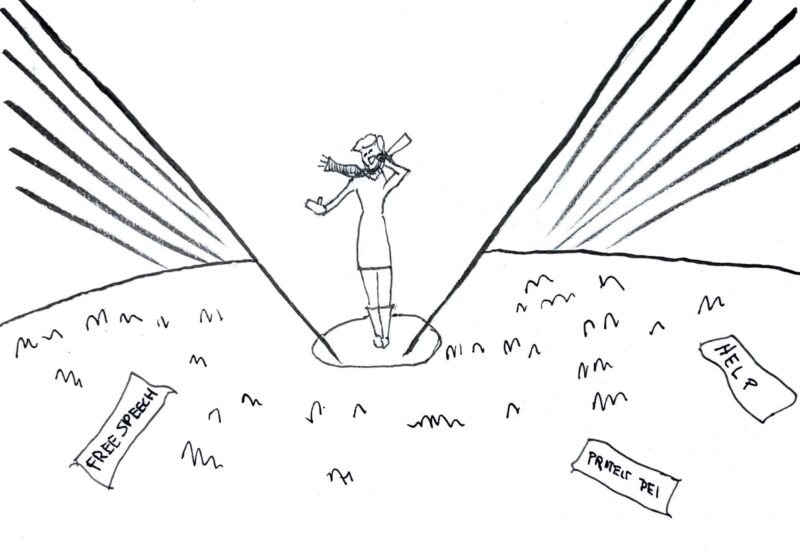Voting began briskly Monday for the revamped Students’ Association Constitution. While most of those who do choose to vote are in favor of the new document, senatorial opposition has only increased since the constitution was finalized and voting started.
Constitutional committee members remain convinced, though, that the process is as fair as possible and many views were represented in the creation of the constitution.
ACJC Chief Justice, senior and constitution committee member Ryan Walters said that as of Wednesday night, approximately 1270 votes were in favor of and about 80 voted not to ratify the document. However, since they must achieve 1921 “yes” votes for ratification, a person who abstains from voting effectively votes no. Walters is optimistic, though.
“We had two-thirds response [of students registering for classes] in the first two days of registration,” Walters said. “Of those who voted, 95 percent are voting yes, and I’m pleased with that.”
Voting continues until the end of the semester. To supplement paper ballots, anonymous Telnet voting was recently initiated.
“The process is anonymous if you want it to be anonymous,” said Walters.
Some critics had questioned the lack of privacy of paper ballots that had students’ names on their votes. The committee points to Telnet voting as an alternative for those who value a secret ballot.
An anti-constitution force surfaced Monday as some senators ? most notably Class of 2004 Senator Peter Ordal ? mounted a campaign in opposition. Ordal’s criticisms, made public on posters displayed around campus, focused mostly on the document itself. Most other senators reached for comment were somewhat in favor of the new constitution, but nearly all were critical of the drafting process and voting procedures. The senate did not issue a formalized statement.
“My problem is with the process,” said deputy speaker of the senate and junior Santo Marciano. “The representation on the committee was not representative of the student body.”
Reflecting the lack of consensus among the senate, other senators had criticisms for the document itself. “The document has a lot of potential,” said Senator Ashley Conner, a senior and constitutional committee member. “But I have heard genuine concerns from students that need to be addressed,” she said.
Those concerns focused on the new role of the senate in the revamped government structure. Some students were confused regarding their involvement with the senate, which would focus more on groups than on individuals.
Ordal, echoing these concerns, claims that “passage of this constitution will mean [that students’] comments will not be required to be shared if it doesn’t suit the member of the Executive branch who is assigned to handle them,” according to his poster. Ordal does not like that students must approach non-elected cabinet officers?not elected senators?to voice their concerns.
The committee stood by their document. “Some people are not going to like [the new constitution],” said committee member and President-elect Lonny Mallach. “However the vast majority support it,” he said.
ACJC associate chief justice, junior and committee member Rachel Morrisey criticized the senate for bringing their criticisms to light after Sunday’s deadline. “No one presented any criticisms at the last two senate meetings,” she said.
Walters responded to critics by saying that the new constitution would allow for many of these concerns to be addressed later on. “The document is flexible,” he said. He also stated that senate representatives were present at most committee meetings and that the committee “reached most decisions by consensus.”
A big source of concern among senators and the public centered on the voting procedures and publicity.
“I don’t like voting for things that I know nothing about,” said freshman Sandra Shaffer.
Walters pointed out that the committee placed posters around campus displaying the document, as well as gave students copies to look at before they voted so they could come back later and make an informed decision. Endorsements and criticisms of the document were also visible at the voting booth for those who did not have the time or interest to read the document.
“We made every effort to fully inform people about the constitution,” Morrisey said.
Ordal expressed disapproval that “the proponents of the document are running the vote,” something which he says is a “mockery” of democratic elections. Ordal does expect the document to pass, despite his efforts, however. He attributes that to voter ignorance, which, he claims, leads people to blindly vote yes.
Morrisey said that senators and critics are welcome to be at the ballot booth with them.
Some had also criticized the committee for not using the bylaws in place for senate and presidential elections in this process. Walters insisted that those in no way apply to a constitutional referendum. For such a referendum, the process, he says, was “about as fair as you can get.”
Walters continues that this document is “better than anything else we’ve ever had.”
Morrisey admits, though, that “this constitution is not going to solve all the problems in the student government,” she feels that “it is a clear improvement over the current constitution.”
Bokoff can be reached at dbobkoff@campustimes.org




